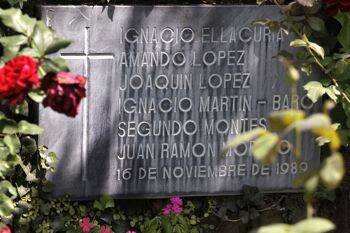Spain's National Court has invoked a special law to order the arrest and trial of 20 former Salvadoran military officers for the 1989 murder of six Jesuit priests, their housekeeper and her daughter. Five of the six Jesuits were naturalized Salvadorans of Spanish birth. In announcing the charges, the Spanish court invoked its universal jurisdiction law, which says that some crimes are so grave they can be tried anywhere. Issuing an indictment May 20, Judge Eloy Velasco Nunez said El Salvador's juridical process "was a defective and widely criticized process that ended with two forced convictions and acquittals even of confessed killers." Among those he indicted were a former Salvadoran defense minister. A 1993 U.N. Truth Commission report said high-ranking Salvadoran military officials were responsible for ordering the murders and ordered a cover-up. The six priests and two women were murdered Nov. 16, 1989, at their residence on the campus of Central American University. A U.N. report concluded that units of the U.S.-trained Atlacatl battalion forced their way into the Jesuits' residence, ordered them into a garden, shot them and did away with witnesses, such as the housekeeper and her daughter. Before leaving, the soldiers scribbled graffiti blaming leftist guerrillas for the killing. In 1991, two Salvadoran officers were convicted of the murders and seven others were found innocent. The two officers were freed in 1993 as part of an amnesty in the peace agreement that ended the nation's 12-year civil war. In a 1992 New York news conference, Alejandro Artucio, an international observer for the International Commission of Jurists, called the Salvadoran jury verdict "arbitrary" and "absurd." He cited evidence that showed the involvement of some of those acquitted in the killing, including that certain soldiers shot specific people. Spain and El Salvador have an extradition treaty.
Spain Indicts 20 ex-Salvadoran Soldiers for 1989 Murders
Show Comments (
)
Comments are automatically closed two weeks after an article's initial publication. See our comments policy for more.
The latest from america
What is happening to migrants in courtrooms across the country is a complete embarrassment to the justice system and an affront to human dignity.
Being a kid in the summer is all about existing in an eternal present moment, a feeling of freedom and potential that it will never go away.
Father Thomas Hennen, vicar general of the Diocese of Davenport, Iowa, has been appointed Bishop of Baker, Oregon.
My writing during these past five years is filled with memories of my long journey with God over a lifetime; but very significantly, it is the expression of my prayer at this later time of my life.








